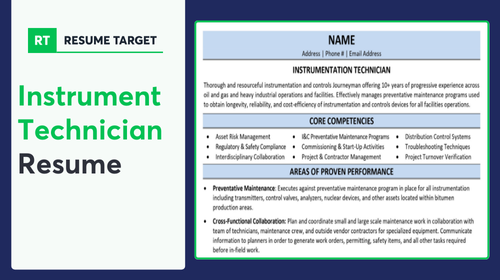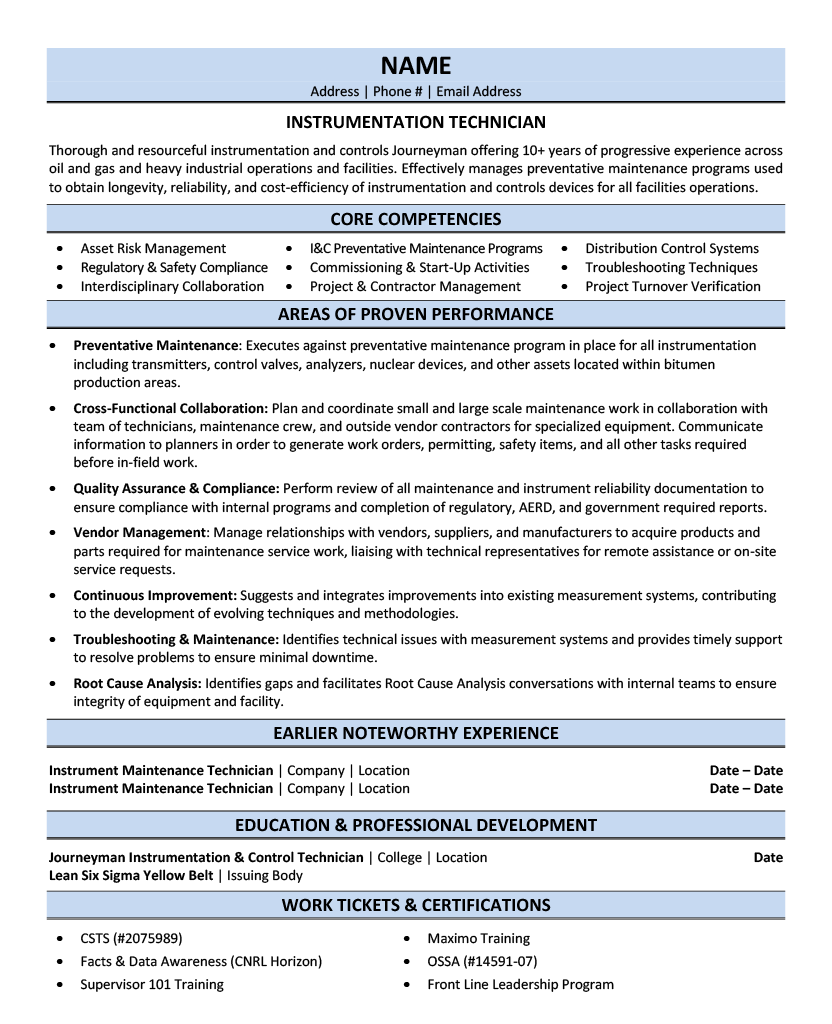

Technical skills are just the start - instrument technicians need to show how they keep critical systems running smoothly. Many qualified techs get overlooked because their resumes focus only on basic maintenance duties.
Are you struggling to showcase the full scope of your expertise? Your resume needs to demonstrate both your hands-on abilities and your problem-solving impact on operations. A well-crafted resume can transform your job search from frustrating to successful.
Resume Target specializes in helping instrument technicians translate complex technical work into compelling achievements. We know how to highlight your calibration expertise, troubleshooting abilities, and direct impact on equipment reliability and plant efficiency in ways hiring managers understand.


In today's automated manufacturing world, instrument technicians serve as the vital link between raw data and operational excellence, with responsibilities including testing, calibrating, and maintaining sophisticated monitoring equipment that keeps production lines running smoothly.
Using an arsenal of specialized tools like voltage meters, electronic probes, and analytical software, these technical professionals ensure the accuracy and reliability of critical measurement systems while troubleshooting complex automated equipment to prevent costly downtime.
Whether you're naturally drawn to precision work or fascinated by industrial automation, a career as an instrument technician offers hands-on technical challenges and opportunities to advance into specialized roles in manufacturing, environmental monitoring, or industrial automation leadership.
Let's talk about the exciting earning potential in the instrument technician field! Your career path as an instrument technician offers compelling compensation opportunities, with top professionals in cities like Two Rivers and Berkeley earning impressive salaries. And guess what? Your earning potential can significantly increase as you gain experience and specialize in specific areas of instrumentation.
Figures from: ZipRecruiter
Start your journey as a Junior Instrument Technician and climb the ladder to leadership roles through experience and certifications. Your career path can lead to senior positions and management opportunities in industrial settings.
To accelerate your career growth, you'll need to master both technical expertise and professional competencies that go beyond basic instrumentation knowledge.
- Advanced troubleshooting and diagnostics - Calibration and programming expertise - Industrial automation systems - Project leadership and team communicationLaunch your career as an Instrument technician by combining hands-on technical training with industry certifications, focusing on control systems and measurement instruments in industrial settings.
To advance in this field, you'll need to develop key technical abilities, including problem-solving and analytical skills that will help you troubleshoot complex instrumentation systems.
Requirements from Zippia
From Hawaii to West Virginia, instrument tech jobs span diverse sectors, with strong demand in equipment repair and government.
Figures from Zippia
Struggling to showcase your technical expertise, calibration skills, and troubleshooting abilities in a way that catches employers' attention? This comprehensive, section-by-section guide will help you craft a professional instrument technician resume that highlights your technical prowess and gets you noticed by hiring managers.
As an instrument technician, you know how to diagnose and fix complex systems with precision, but condensing your expertise into a few powerful sentences can feel more challenging than troubleshooting a faulty PLC.
While you excel at calibrating sophisticated instruments and maintaining critical control systems, translating these technical abilities into compelling resume language that catches a hiring manager's attention requires a different kind of precision - one that showcases both your hands-on expertise and problem-solving capabilities.
How would you describe your technical expertise across different instrumentation systems and your ability to integrate both electronic and mechanical components in your work?
Reason: This helps establish your broad technical foundation and versatility as an instrument technician, showing potential employers you understand both the electronic and mechanical aspects of the role.
What would you say are your most valuable professional qualities that have helped you maintain critical instrumentation systems and ensure operational reliability?
Reason: This question helps you articulate your core professional strengths and how they align with the fundamental responsibilities of an instrument technician, particularly in maintaining system integrity.
How would you characterize your approach to troubleshooting complex instrumentation issues while balancing safety protocols and efficiency in industrial settings?
Reason: This helps you demonstrate your problem-solving methodology and safety consciousness, two critical aspects that employers look for in experienced instrument technicians.
As an instrument technician, you need to showcase both your hands-on technical abilities and your analytical troubleshooting skills, from calibrating sophisticated measurement devices to maintaining complex control systems.
Your resume should highlight your expertise with specific instrumentation systems and industry standards, while also emphasizing your ability to perform essential maintenance, repairs, and safety protocols in industrial settings.
Showcase your technical expertise by organizing your work history into three powerful sections: a concise role overview that sets the stage, measurable achievements that highlight your calibration and maintenance wins, and core responsibilities that demonstrate your hands-on instrument mastery.
Many instrument technicians struggle to effectively communicate their technical expertise and problem-solving capabilities beyond basic maintenance duties. Transform your experience into compelling achievements by connecting your calibration precision, troubleshooting success, and system optimization work to measurable improvements in equipment reliability, downtime reduction, and cost savings.
The responsibilities section demonstrates how Instrument Technicians maintain critical measurement and control systems beyond basic maintenance tasks. Your role directly impacts plant safety, efficiency, and quality control, so explain your duties in terms that showcase both technical expertise and business value.
Your technical education and industry certifications are crucial proof points of your expertise in calibrating and maintaining industrial instrumentation systems. Focus on highlighting your most relevant certifications first, especially those related to process control systems, safety instrumentation, and specialized equipment you've been trained to maintain.
Now that you've built a strong foundation using Resume Target's proven resume writing guidelines, you're ready to transform your resume into a powerful tool for landing instrument technician positions.
While many job seekers only customize their cover letters, successful instrument technician candidates know that personalizing their resume for each position is what sets them apart from the competition.
By carefully aligning your technical skills, calibration experience, and maintenance expertise with each job description, you'll not only sail through ATS screening systems but also immediately show hiring managers you're the perfect match for their instrumentation team.
Ready to turn your resume into your secret weapon? Let's make every word count and show employers you're the instrument technician they've been searching for!
Don't let a lack of professional experience hold you back from launching your career as an Instrument Technician!
Your technical education, hands-on lab work, and practical projects can demonstrate your ability to calibrate, maintain, and troubleshoot industrial instruments and control systems.
Focus on highlighting your technical training, any relevant certifications, and hands-on experience from lab work or internships to create a compelling resume.
For detailed guidance on structuring your technical qualifications, check out the Student Resume Writing Guide to help showcase your potential.
Your technical training and hands-on project experience are powerful assets that deserve to be showcased right at the top of your resume.
Focus on highlighting your practical skills, certifications, and any experience gained through lab work or training programs to demonstrate your readiness for professional instrumentation work.
"Detail-oriented and technically skilled Instrument Technician graduate with comprehensive training in calibration, maintenance, and troubleshooting of industrial instrumentation systems. Proficient in using digital multimeters, oscilloscopes, and calibration tools, with hands-on experience gained through technical coursework and laboratory projects. Demonstrated ability to read and interpret technical drawings, P&ID diagrams, and equipment manuals. Seeking to leverage strong analytical skills and technical foundation to contribute to a dynamic industrial maintenance team."
Now's your chance to showcase the technical training and certifications that make you a qualified instrument technician - let's make your educational background truly stand out!
Transform your coursework in areas like calibration, PLC programming, and industrial electronics into compelling content by highlighting hands-on lab projects and specialized certifications that demonstrate your technical expertise.
Insufficient data available despite thorough search.Relevant Coursework: Industrial Electronics | Process Control Systems | Instrumentation Calibration | PLC Programming | Electrical Safety Standards | Technical Documentation
Key Projects:
Process Control System Integration: Designed and implemented a small-scale automated control system for temperature and pressure monitoring in a laboratory setting.
Industrial Instrumentation Troubleshooting Project: Collaborated with a team of four to diagnose and resolve complex instrumentation issues in a simulated industrial environment.
Leverage your technical training, certification coursework, and hands-on experience to create a powerful skills section that showcases your ability to calibrate, maintain, and troubleshoot industrial instrumentation systems.
As an entry-level Instrument Technician, your foundation in these core skills positions you well for a career path with excellent growth potential in industrial automation and control systems maintenance.
Let's face it - translating your hands-on expertise with complex instrumentation systems into compelling resume content can feel like trying to calibrate a faulty transmitter blindfolded.
At Resume Target, we specialize in crafting resumes for Oil and Gas professionals like you, transforming detailed technical work into clear achievements that hiring managers understand.
Our proven track record includes helping instrument technicians showcase their PLC programming, calibration expertise, and troubleshooting wins in ways that make them stand out from the competition.
With major projects ramping up across the Oil and Gas sector, now is the perfect time to upgrade your resume - connect with us today to ensure your expertise gets the attention it deserves.
Impress any hiring manager with our Oil & gas resume writing service. We work with all career levels and types of Oil & gas professionals.
Learn More → Oil & gas Resume Writing Services